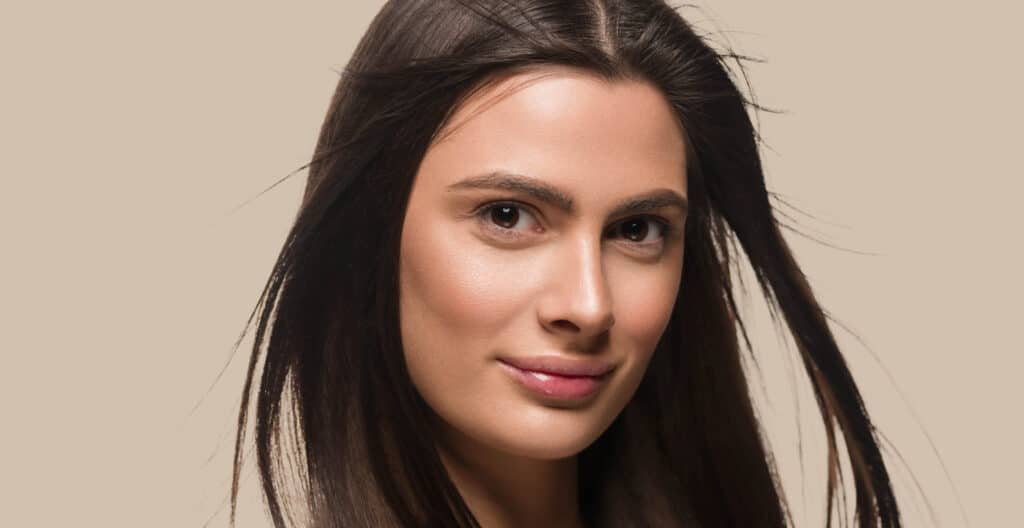Have you ever considered using a DHT blocker for women when you’re dealing with hair loss or thinning? What is it? What does it do? How and why does it work? Let’s learn the answers for these questions and more as we delve deeper into DHT blockers for women.
Why is DHT a Problem for Hair?
Dihydrotestosterone is an androgen that’s derived from testosterone. This is both a male hormone and androgen that’s potent and important for several functions in our body. However, in excess it poses a real problem to hair.
Even male pattern baldness and female pattern baldness are linked to DHT levels. While it affects men more than women, it still does affect women.
Did you know hair loss and DHT levels are linked? Increased DHT levels can cause hair thinning and hair loss in women, often leading to androgenetic alopecia or female pattern hair loss. That’s why a DHT blocker is often recommended when women face hair loss or thinning.
What is a DHT Blocker?
DHT short for Dihydrotestosterone is a potent androgen that’s an offshoot of the male hormone testosterone. A DHT blocker helps mitigate the side effects caused by DHT.
While DHT is more of a problem for men, women are affected too. That’s why DHT blockers for women are now available. The best part is that there are natural DHT blockers these days.
DHT and Hair Loss
So, we know excess DHT levels cause hair issues but why? What exactly happens? Isn’t that what we’re looking to find out?

DHT hormones cause hair loss in men and women. Basically, DHT attaches itself to androgen receptors present in hair follicles and shrink the hair follicles resulting in hair loss.
Hormonal imbalances are the leading cause of hair loss in women, which is why DHT blocking medication or remedies are most sought after. Did you know DHT blockers have shown good results in combating pattern hair loss?
How do DHT Blockers Work?
DHT blockers work by stopping DHT from attacking our hair follicles and shrinking them. How do they do that? We all know DHT binds to androgen receptors and DHT blockers prevent them from binding, or reduce DHT levels.
While they do block DHT production, they do not affect testosterone levels in our body. We all know androgenic alopecia is due to increased DHT levels. By preventing hair loss and improving hair growth, DHT blockers prevent the hair loss problem from progressing to androgenic alopecia.
Benefits of Using a DHT Blocker for Women
Nowadays, there are natural DHT blockers. Specialists are recommending DHT blockers for women who are dealing with hair loss and thinning. Hair loss and hair thinning left unchecked can lead to androgenetic alopecia, experts say.
Heard about male pattern baldness or female pattern hair loss? They’re the common names for androgenic alopecia and most specialists resort to DHT blockers for women to manage or prevent pattern hair loss. Wondering why that is?
Did you know DHT blockers can curb hair fall and improve hair growth? They can also combat hormone imbalances. Isn’t that the real problem for many women dealing with hair loss?
Certain hair loss conditions in women respond better to them including frontal fibrosing alopecia. However, it’s important to get a specialist’s advice before resorting to any hair loss treatment including DHT blockers.
What are the Types of DHT Blockers?
When considering a DHT blocker, there are multiple options. Specialists will choose what’s best for you based on their observation and may be any tests they recommend.
Topical DHT Blockers
Have you heard of topical Dutasteride and topical Finasteride? They’re examples of topical DHT Blockers and recommended for female hair loss.
Since they’re applied topically, they don’t affect our body’s DHT levels, just topically on the scalp. This is a great option for those who don’t need oral consumption or don’t prefer it.

Natural DHT Blockers
There are very good DHT blockers for women and that’s our first preference and suggestion when anyone walks into Vitamins Revive. Examples include pumpkin seed oil, saw palmetto, green tea, etc. The best part is they also promote hair growth and improve hair health.
Oral DHT Blockers
Just like topical application, finasteride and dutasteride are also available for oral consumption. They can be bought with a valid prescription and can have adverse effects in some individuals. For this reason, it’s important that a specialist looks into your issue and determines if that’s a necessity for you.
What are Some Side Effects to Consider?
There are negatives and positives for any medication and a DHT blocker is no exception.
While they’re known to promote hair growth and hair regrowth, it is usually only for the duration of the treatment and often hair loss resumes once the treatment is complete.
Oral DHT blockers for women can interfere with male fetal development in utero. There are potential risks to fetal development and is probably one of the major side effects to consider.
They can also alter one’s sexual life, result in sexual dysfunction and can cause breast tenderness in women.
How to Reduce DHT Naturally?
You can also reduce your DHT levels through other means. Would you like to know what they are?
Did you know regular exercise and a balanced diet can reduce DHT levels naturally? Having supplements like green tea, saw palmetto and pumpkin seed oil help reduce DHT levels.
Reducing stress levels and an active lifestyle can help reduce DHT levels. It really helps to curb hair loss and improve hair growth when you reduce DHT levels.
Conclusion
Earlier male androgenetic alopecia was more common, or widely known. But not, hair loss in women is more widely known and accepted. Increasingly more women are aware and try to take preventive measures.
They start looking for natural hair loss treatments and options for promoting hair growth and curbing hair loss or other related issues. Female hair loss is a reality for many women, but they’re doing everything so they don’t further hair loss.
Every natural option will take more time than other hair loss treatments but natural options are fairly safer and even effective when done right. So try natural options and see where it goes before checking for other options. Discuss with your specialist and see what options seem ideal for you.
Female hair loss is not the end of the world, just a change that can be resolved or managed with effort and consistency. Don’t worry and work yourself to the bone worsening it, rather give natural supplements a try for their DHT blocking properties and see how they work for you.
FAQs
What is the alternative for oral DHT blockers?
Considering the many side effects we all look for alternatives. If that’s you, chin up. Low level laser therapy and platelet rich plasma therapy are options besides using natural blockers for women.
What is the best DHT blocker for women?
Oral DHT blockers are risky and should be kept as a last resort considering their adverse effects. On the other hand, topical DHT blockers can be used without worrying too much, though there are less studies on what’s effective. Natural DHT blockers can be safely consumed or used topically and have shown to improve hair growth and health, not just curb hair loss.
How long does it take to see results?
It truly depends on multiple factors but as a rule of the thumb – patience is the key. It might take time, but it does curb hair loss and stimulate hair growth. Dosage is another factor to consider. Prescription blockers take anywhere from 3 – 6 months and natural blockers take longer. Patience and consistency seems to be the key.
Is a balanced diet important?
While taking or using blockers, having a healthy and balanced diet is the key and has shown to render better results. It works for male pattern baldness and female pattern hair loss and even improves one’s overall health.
What’s the best hair loss treatment?
When you want to regrow hair and stop growth of body hair or facial hair especially in women, prescription DHT blockers have been the go-to option for specialists. Blocking DHT resolves most if not all issues related to high DHT levels and hormonal imbalances. But there are other natural options or even surgical options, but what’s best depends on the individual, their requirements and preferences.
Why is saw palmetto the popular choice for hair loss in women?
It’s a natural DHT blocker and many studies have shown positive results with regular usage. Unlike oral finasteride or other oral other options, saw palmetto offers scores of benefits without adverse side effects.

